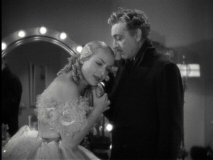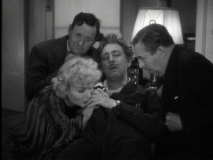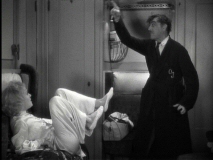Twentieth Century (Howard Hawks, 1934)
 Less a backstage farce than prototypical
screwball, Howard Hawks’ brilliantly funny Twentieth Century set the
stage for the subgenre that most consider the peak of American screen humor.
Starring Lionel Barrymore and Carole Lombard in what might well be the peak of
either’s comedic screen career, the film presents a world that is so frenzied
and unsentimental that finding love in it, even of a sweetly dysfunctional kind,
comes as a true surprise. Howard Hawks’ comedies generally have a more
negative worldview than his dramas, which tend to be propped up by a realist’s
outlook and a work ethic so profound that it transforms into a philosophy.
Compared to his dramas, Hawks’ funny films are more frenzied and more
despairing, with characters that are more prone to histrionics due to their
desperate investments in their romantic entanglements.
Less a backstage farce than prototypical
screwball, Howard Hawks’ brilliantly funny Twentieth Century set the
stage for the subgenre that most consider the peak of American screen humor.
Starring Lionel Barrymore and Carole Lombard in what might well be the peak of
either’s comedic screen career, the film presents a world that is so frenzied
and unsentimental that finding love in it, even of a sweetly dysfunctional kind,
comes as a true surprise. Howard Hawks’ comedies generally have a more
negative worldview than his dramas, which tend to be propped up by a realist’s
outlook and a work ethic so profound that it transforms into a philosophy.
Compared to his dramas, Hawks’ funny films are more frenzied and more
despairing, with characters that are more prone to histrionics due to their
desperate investments in their romantic entanglements.
 It seems obvious that at least part of
the reason behind the rapidly increasing stakes in the battle of the sexes in
films like Twentieth Century and It Happened One Night is that in
1934, the year generally cited as screwball’s genesis, the self-imposed
Production Code began to be enforced. Suddenly, sex comedies were without the
ability to refer to sex on screen, and as a result, courtship became the
narrative engine of practically every screwball comedy. With their ability to
exude sex appeal considerably toned down, the stars, at least those who
weren’t involved in the serious message movies of the time, started playing
for laughs instead. The script of Twentieth Century, based on a stage
play, skewers its stars’ vanities, but the actors, especially Barrymore,
are in on the joke as well, poking fun at their own inflated screen personas.
Barrymore’s performance directly challenges the common perception that his
serious acting often verged on hamminess. Director Hawks famously claimed that
this was the first Hollywood comedy where the stars, and not the supporting
cast, took the pratfalls, and while that may or may not be the case, there’s
no doubt that the film was ahead of its time in its assault on celebrity
pomposity. In Twentieth Century, there’s perhaps no finer distillation
of this shift that the moment at the end of the first reel where it becomes
apparent that the love of the theater that Barrymore’s character has been
going on about in fact masks his lust for his leading lady. Because the genre
always gave women an equally fair shake, it’s not at all
surprising to later find out that her seeming indignation toward him masks hers.
It seems obvious that at least part of
the reason behind the rapidly increasing stakes in the battle of the sexes in
films like Twentieth Century and It Happened One Night is that in
1934, the year generally cited as screwball’s genesis, the self-imposed
Production Code began to be enforced. Suddenly, sex comedies were without the
ability to refer to sex on screen, and as a result, courtship became the
narrative engine of practically every screwball comedy. With their ability to
exude sex appeal considerably toned down, the stars, at least those who
weren’t involved in the serious message movies of the time, started playing
for laughs instead. The script of Twentieth Century, based on a stage
play, skewers its stars’ vanities, but the actors, especially Barrymore,
are in on the joke as well, poking fun at their own inflated screen personas.
Barrymore’s performance directly challenges the common perception that his
serious acting often verged on hamminess. Director Hawks famously claimed that
this was the first Hollywood comedy where the stars, and not the supporting
cast, took the pratfalls, and while that may or may not be the case, there’s
no doubt that the film was ahead of its time in its assault on celebrity
pomposity. In Twentieth Century, there’s perhaps no finer distillation
of this shift that the moment at the end of the first reel where it becomes
apparent that the love of the theater that Barrymore’s character has been
going on about in fact masks his lust for his leading lady. Because the genre
always gave women an equally fair shake, it’s not at all
surprising to later find out that her seeming indignation toward him masks hers.
 As the two lovers hopelessly attempt to
convince themselves that they are self-sufficient, the world around them grows
increasingly harrying. Hawks paces the movie superbly, ensuring that the opening
night pressures from first act’s New York prologue don’t dissipate when the
remainder of the movie moves on board an eastbound train. A large, loopy
supporting cast continues to turn the screws, but most of the friction is
created when the two leads’ monstrous egos rub up against one another. Filled
with fast-talking energy and excessive devotion to the idea of one another, to
their own egos, and to their craft, these two spitfires are clearly made for one
another. The best moments in Twentieth Century occur whenever they test
one another’s worthiness through a battle of wits (or kicks). Hawks knows
this, and lets the actors run with their roles, resulting in a comedy that’s a
true classic, regardless of its generic classification.
As the two lovers hopelessly attempt to
convince themselves that they are self-sufficient, the world around them grows
increasingly harrying. Hawks paces the movie superbly, ensuring that the opening
night pressures from first act’s New York prologue don’t dissipate when the
remainder of the movie moves on board an eastbound train. A large, loopy
supporting cast continues to turn the screws, but most of the friction is
created when the two leads’ monstrous egos rub up against one another. Filled
with fast-talking energy and excessive devotion to the idea of one another, to
their own egos, and to their craft, these two spitfires are clearly made for one
another. The best moments in Twentieth Century occur whenever they test
one another’s worthiness through a battle of wits (or kicks). Hawks knows
this, and lets the actors run with their roles, resulting in a comedy that’s a
true classic, regardless of its generic classification.
90
Jeremy Heilman
03-06-05